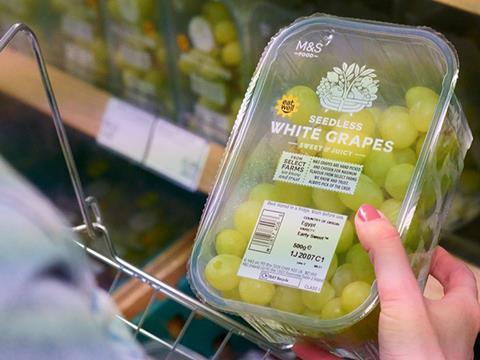
M&S has announced that ‘best before’ dates will be removed from the labelling of over 300 fruit and vegetable products, and replaced with a new code that staff can scan to check freshness and quality.
The retailer says the decision to remove ‘best before’ dates from over 300 fresh produce lines follows a successful trial. The change will apply to 85% of M&S’ produce offering, including apples, potatoes, and broccoli, among others.
According to M&S, removing ‘best before’ dates could encourage customers to throw away less food at home by using their judgement as to whether it is safe to eat. The retailer has pledged to halve food waste by 2030, with 100% of edible surplus targeted for redistribution by 2025.
Dates will be replaced with a new code that can be scanned by M&S store colleagues to check the freshness of the product and allow for quality control, the retailer adds.
The removal of ‘best before’ dates for some fruit and vegetable lines will be carried out across M&S stores from this week.
Andrew Clappen, director of food technology at M&S, comments: “We’re determined to tackle food waste – our teams and suppliers work hard to deliver fresh, delicious, responsibly sourced produce at great value and we need to do all we can to make sure none of it gets thrown away.
“To do that, we need to be innovative and ambitious – removing best before dates where safe to do so, trialling new ways to sell our products and galvanising our customers to get creative with leftovers and embrace change.
Catherine David, director of collaboration and change at WRAP, adds: “We’re thrilled to see this move from M&S, which will reduce food waste and help tackle the climate crisis. Removing dates on fresh fruit and veg can save the equivalent of 7 million shopping baskets of food being binned in our homes.
“We urge more supermarkets to get ahead on food waste by axing date labels from fresh produce, allowing people to use their own judgement.”
In a report released by WRAP earlier this year, the organisation claimed that some plastic packaging adds to food waste by forcing consumers to buy in bulk and creating confusion over ‘best before’ dates. WRAP says that measures including keeping fridges at a lower temperature and using smell and appearance to assess produce are more effective ways to reduce food waste.














No comments yet